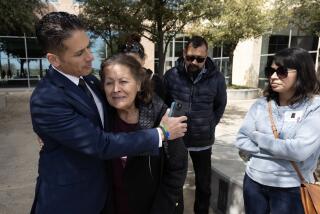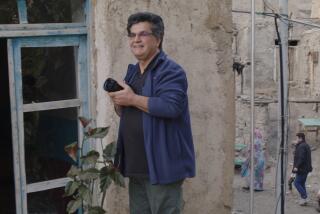Panah’s Mother Tells Court of Abusing Him : Sentencing: Testimony, meant to gain jury’s sympathy for convicted murderer so he will not get death penalty, brings him close to tears.
- Share via
VAN NUYS — Taking the witness stand in a bid to spare her son from the death penalty, the mother of convicted child murderer Hooman Ashkan Panah portrayed herself Friday as a harsh and controlling mother who slapped and bit her son when he was a boy.
She also admitted that she showered with him when he was 9, and slept in the same bed with him when he was about 13. Later, when Panah was a young man, she said, she broke off two of his romantic relationships by threatening suicide.
Mehri Monfared, 47, a former cable television producer and talk show host, told a Superior Court jury during a day of compelling defense testimony that she wanted only the best for her only child.
“I’m sorry,” she said, weeping uncontrollably, “but he is all my life. I raised him all by myself. . . . I loved him. I was so hard with him, too.” Admitting that at various times she also beat Panah, locked him in a room and shaved his head, she said she punished him “because I wanted him to be a good man. I am father and mother to him.”
Panah, now 23, faces the death penalty or life in prison for the sodomy-murder of Nicole Parker, the 8-year-old daughter of a neighbor at his Woodland Hills apartment complex. Nicole’s disappearance on Nov. 20, 1993, prompted a massive search until her body was found 36 hours later in a suitcase in Panah’s bedroom closet.
Lori Parker, Nicole’s mother, listened intently to the testimony. Outside the courtroom, she said, “I do feel sorry for her. But her son is alive and my daughter is dead.”
Monfared appeared as the key witness in a defense built around Panah’s troubled life story and possible psychosis, two factors the jury could weigh in deciding whether he should receive the death penalty for killing Nicole during a sexual attack.
Monfared sobbed uncontrollably at first, glancing often at Panah and apologizing to him. Later, she maintained her composure even as she admitted to incident after incident of abuse, neglect and bizarre behavior.
Her testimony sometimes brought Panah to the brink of tears.
As a 4-year-old, she said, Panah deliberately cut his finger and said he didn’t want to live. She had separated from Panah’s father, whom she married at age 20, because he beat her while she was pregnant.
Panah “wasn’t right” when he was born in 1971, during a difficult delivery, she testified. As an infant, Panah fell and hit his head when his father pushed her during an argument, she said.
Under questioning by defense attorney Robert M. Sheahen, Monfared admitted beating Panah when he was a young boy and punishing him by slapping him and hitting him with shoes. After she left her husband and moved back to her parents’ home, her brothers and sister beat him with belts, she said.
She said Panah’s childhood also was punctuated by fearful nighttime trips to the basement, seeking shelter from bombing in the war between Iran and Iraq.
She testified to three key incidents that occurred in Tehran when her son was about 10.
When Panah refused to get a haircut, Monfared said, she and an uncle threw him to the ground, and cut his hair with a knife. She made him go to school with his newly bald head as a lesson, she said.
“It hurt Hooman a lot because he was crying for a few days,” she recalled. She said he later told her, “You treat me as a dog, as a sheep, that you cut my hair like that.”
She said she slapped him in the face when he claimed at age 10 that he and a cousin were being sexually molested by her elderly father.
“I called (Hooman) a liar,” she said. “I couldn’t believe that an old man would do something like that to children.”
At about that same time, she said, she gave her son the cold shoulder for a year and called him a derogatory Farsi word for homosexual after a school principal told her “Hooman was acting like a gay.”
She admitted she would hurl the epithet at her son whenever they disagreed.
A year later, Monfared and Panah left Iran for Turkey. Panah never saw his father again. Mother and son shared a bed in a tiny hotel room with a single window overlooking an alley in the worst section of the Turkish capital, Ankara. When she worked, she locked Panah in the room to study.
“I had no choice,” she said.
Two years later, they left Turkey for Germany. Panah, then about 15, was left behind at a German home for teen-agers while she traveled to Mexico, and then to the United States. The plan was to send for Panah when she received her green card, a process she expected to take a few weeks. It took two years.
When Monfared returned to Germany to fetch her son, he was happily involved with a young woman he planned to marry. He had no interest in leaving with his mother.
“I didn’t agree with him. I didn’t accept it,” she testified. “I said, ‘I am your mother and you are underage. . . . If you love me, if I am your mother, you have to come with me. If you don’t come, I’m going to leave you alone forever.”
She said she threatened to kill herself.
Six months after his arrival in the United States in 1988, Panah tried to kill himself by overdosing on over-the-counter allergy medication, Monfared said. The attempt followed a quarrel between mother and son. Panah wanted to wear an earring. His mother wouldn’t allow it “because it wasn’t our culture.”
Treating physicians recommended a stay at a mental health facility, but Monfared said she told the doctors her son was fine. When social workers came to her home, she said, she refused to talk with them, saying she had to go to work.
Later, when Panah began to fall in love with another young woman, his mother again threatened suicide if he didn’t break off the relationship, she said.
“I didn’t want to hurt him, but that girl wasn’t good,” Monfared said.
She said she suspected the girl of theft. “There wasn’t any choice. I thought I was doing right because I didn’t want him to get involved with any problems.”
Testimony continues Monday.
More to Read
Sign up for Essential California
The most important California stories and recommendations in your inbox every morning.
You may occasionally receive promotional content from the Los Angeles Times.













